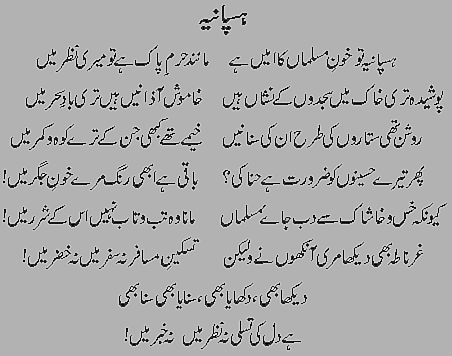|
|
|
|
|
|
|
|
|
|
|
|
|
|
|
|
|
|
|
'Iqbal's Visit to Andulas' |
|
In 1932, Iqbal made a second visit to Europe (earlier he had been there for his studies) to renew old acquaintances and make new ones and to reflect and write. He attended conferences in Britain and met various scholars and politicians, including the French philosopher Henri Louis Bergson and the Italian dictator Mussolini. In January 1933, he visited Spain (with special permission from England, for until not long ago, Muslims and Jews were forbidden to enter Spain). This visit inspired three beautiful poems, which were later incorporated into a major composition, Bal-I Jibril (Gabriel's Wing). The trip also provided him an opportunity to experience Spain's Islamic heritage. That heritage, indeed, has its reminders in every nook and corner of contemporary Spain, but especially in the province of Andalucia. That is where the two most prominent monuments of Islam's legacy are located: Granada (Arabic Gharnata) and Cordoba (Arabic Qurtaba). He saw, through the eyes of his eyes, the presence of Muslims in history, especially conspicuous because he could see former mosques in every little town along the way. Among the various monuments of Islamic Spain, the most intense yearning of his soul was to experience the Grand Mosque (Le Mezquita) of Cordoba, built in the 8th century by Emir Abdul Rehman I, but now called The Holy Cathedral. [The construction of the great mosque of Cordoba began in 786 CE on a site purchased for 100,000 gold dinars]. For Iqbal, just being there was overwhelmingly therapeutic, for there, before his own eyes, was about the most vivid reminders of the Golden Age of Islam, an era that provided the roots of Europe's Enlightenment. At the great mosque of Qurtaba, he wrote
Masjid-e-Qurtaba and offered his prayers, although this ritual had
been forbidden by the Government of Spain. About this dilemma, "The Mosque of Qurtaba," he
bemoaned: As he walked through Alhambra, he vicariously absorbed into the past and began to experience an enormous sense of pride and awe at the glory that was Islam. There he recalled about the Muslim ruler, Abu Abdallah who had signed the treaty on November 25, 1491 for eventual surrender of Granada in January 1492 to the Catholic King Ferdinand and Queen Isabel. [The Treaty of Granada]. And when Abu Abdallah shed tears and cried out, "Allah O'Akbar," his mother said to him, "Cry you like women over a kingdom lost that you could not defend like a man." Indeed, my eyes observed and absorbed Granada; but In the end, Iqbal penned down his observation in the poignant poem "Hispania": |
|
|
For Suggestion, Comments and Queries:
